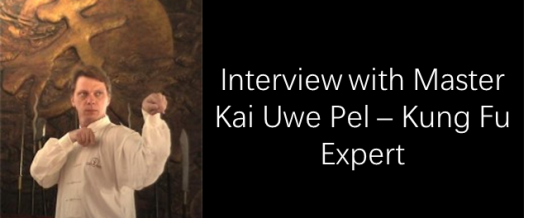
By Andy Best
http://shanghaiist.com/2008/01/21/interview_maste.php
Master Kai Uwe Pel has been a fixture on the Shanghai Kung Fu scene for nearly six years, working at the Jing Wu school and the Long Wu International Kung Fu Centre before finally going it alone in 2006. He has spent more than 25 years in Chinese martial arts. He lived and worked in Hong Kong and then Singapore where he studied Seven Star Praying Mantis Kung Fu.
Pre-war Shanghai was the site of the original Jing Wu school and where Seven Star Mantis spread to the world – is this still a Kung Fu town?
Yes, in the old days it was a national centre. The Jing Wu school was fully running before 1920 in Zhabei. Huo Yuan Jia was the most famous, although many people think he’s fictional these days. You can’t compare now to then but you can still find a lot of Bau Gua Zhang, Taiji and Xinyi, for example.
In the days of Bruce Lee and Shaw Studios, Kung Fu captured the imagination. Are people still excited about Kung Fu?
Sure. If you talk about movies, Jet Li and still Jackie Chan are huge on the mainland. Also, I got so many E-mails asking me about coming to Shanghai to study Kung Fu that I eventually took my address off our website at the time.
Can you really just walk into a park here and find a teacher?
Yes, of course. I found Luxun Park in Hong Kou quite interesting in the mornings.
But if you go there, do you know which styles they teach or if they are good or bad teachers?
We have the internet, do research first. I’d say about 20% are still willing to take people into their groups free of charge.
What’s the biggest myth about Chinese Kung Fu?
A lot of people in my classes over the past few years here asked me a lot of strange things in break times. About ‘qing gong’ or qi power or whatever. Kung Fu can help you be mentally strong and with self defence but as for being an unbeatable warrior, you’d have to consider the times. I mean, guns for example.
I saw that most young Shanghainese students like Karate and Taekwondo, the classes are full. People join martial arts classes to learn fighting.
Young people here see the Modern Wushu sport or watch “Twins” flying around on wires on TV. Compared to those, something like Karate is the obvious choice. Traditional Chinese martial arts are rare in comparison.
So, where do Kung Fu masters go to relax in Shanghai?
For a nice relaxed atmosphere I like Sofa Bar and Café off Xinhua Road. I like Paulaner, of course (I’m from Germany). Most of all I like to walk my dog, a German Shepard called Picasso.
Do people have an issue with you being German and teaching Kung Fu in China?
Well, some people seem to be quite focused on that sort of thing but it’s down to a person’s ability and skills to win people over. Students don’t have a problem once they’ve been in a couple of classes. I think it’s only a problem among the world of Kung Fu teachers. You think office politics are bad.
You are using your time here to write a book, how’s that going?
Now is the right time. Our art is from the classical age and is increasingly rare now. We need books, not in a teach-yourself way but to increase awareness and knowledge in confused times. People can’t differentiate between the traditional styles, competition orientated clubs or the Modern Wushu sport.
You’re also an I.T. manager, what’s harder to master: Kung Fu or Computers?
Well it’s the same principal. Continuous effort. Kung Fu just refers to a skill you got through constant practice and perseverance.
To finish up: give us the expert’s opinion, what’s a good Kung Fu movie to watch?
My favourite is definitely “Iron Monkey”. But I’m talking about the 1983 Shaw Studios movie starring Chen Kuan Tai. Don’t confuse it with the Donnie Yen movie much later on. But also, if you want to train Kung Fu for real, better not watch too many of those movies.
DEC
2017
